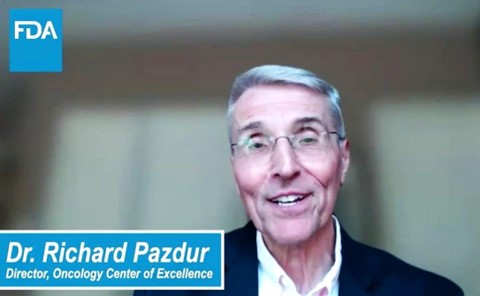Project 5 in 5
Crowdsourcing 5 clinically relevant questions for 5 pragmatic trials

The FDA Oncology Center of Excellence (OCE) Project 5 in 5 was a crowdsourcing initiative to ultimately identify 5 clinically relevant questions that can be answered through use of pragmatic clinical trials, using FDA-approved oncology therapies, over the next 5 years. The crowdsourcing initiative ran from May 5 through July 5, 2024, and was open for anyone to submit ideas.
The OCE is evaluating the ideas from that initiative and further discussing the concept of pragmatic elements in clinical trials with government agencies, cooperative groups, and others who may be interested in implementing these pragmatic clinical trials, and diligently working on opportunities to evaluate ways in which more pragmatic design elements can be incorporated into clinical trials.
The OCE is serving as the convener but will not be involved in the implementation or conduct of the clinical trials themselves. This initiative is important to accelerate patient-centric clinical trial innovation.
Click the image below to hear about this crowdsourcing project from Richard Pazdur, MD, Director of the Oncology Center of Excellence!
Pragmatic Clinical Trials
Pragmatic clinical trials aim to streamline data collection and design by collecting only necessary information to answer the research question. The focus should be on efficacy, using a straightforward clinical benefit endpoint such as overall survival. Traditional prospective randomized controlled trials in oncology are typically associated with significant monitoring, assessments, tests, and clinical follow up visits that can be burdensome to trial participants, investigators, and trial sponsors.
Pragmatic clinical trials may incorporate design elements that are more reflective of routine clinical practice. Pragmatic trial elements take advantage of functional efficiencies such as fewer and broader eligibility criteria and flexibilities in trial delivery and outcome measurement. The degree of flexibility is tailored to the trial context, keeping the safety of patients and the integrity of trial data at the forefront. Studies conducted in the real-world setting can reduce the burden of trial participation, with the hope to facilitate more diverse trial populations, more rapid enrollment, and reduced attrition. Pragmatic trials may have the potential to result in evidence that is more broadly representative of the general population affected by the clinical question.
Project 5 in 5 FAQs
Q: Where can I get more information about pragmatic clinical trials?
A: Please visit the OCE's Project Pragmatica.
Q: How will the FDA select the top 5 ideas for pragmatic clinical trials?
A: FDA hematologists, oncologists, and clinical experts will review and identify the most popular ideas from the external crowdsourcing that meet the outlined specifications.
Q: Will the FDA conduct these clinical trials?
A: No, the FDA’s Oncology Center of Excellence plans to provide these ideas for pragmatic clinical trials to the oncology community for discussion and potentially involve the National Cancer Institute (NCI), NCI-supported clinical trials cooperative groups, advocacy organizations, pharmaceutical companies, and other potential funders to encourage qualified entities to carry out these trials.


